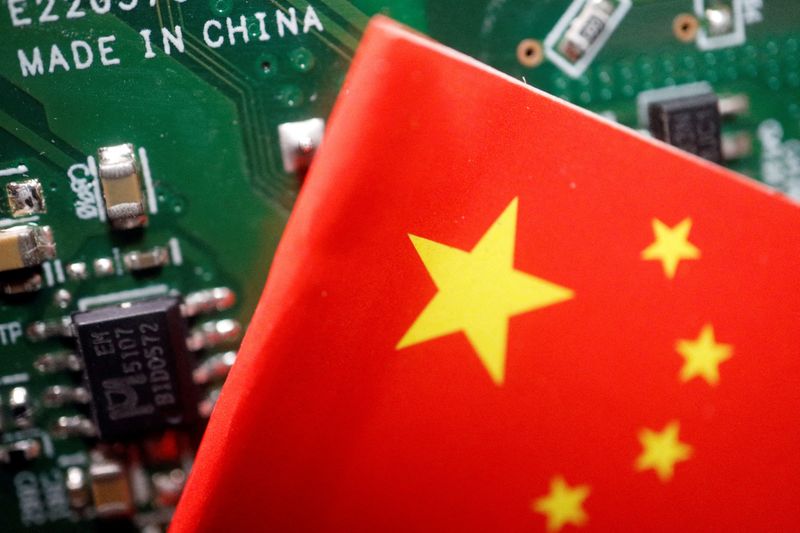By Eduardo Baptista and Heekyong Yang
BEIJING/SEOUL (Reuters) – Chinese chip companies targeted by Washington with new export controls have pledged to accelerate supply chain localization and said they could continue production thanks to recent efforts to stockpile equipment.
The latest measures, the third U.S. crackdown on the Chinese sector in three years, targeted high-bandwidth chip, software and memory manufacturing equipment. They restrict exports to 140 companies, including chip equipment manufacturer Naura Technology Group and ACM Research (NASDAQ:).
Empyrean, a maker of electronic design automation (EDA) tools also known as Beijing Huada Jiutian Technology, said inclusion on the list would have little impact on its business.
“The company will use the development opportunity to accelerate the localization process of full-process EDA tools,” the company said in a stock exchange statement.
Jiangsu Nata Opto-Electronic Material, which manufactures materials used in making chips, told Chinese news outlet Yicai that it had stockpiled and would also make domestic replacements, but did not provide details.
Others, such as semiconductor test system supplier Beijing Huafeng Test & Control Technology, said they had already fully localized their supply chain, the 21st Century Business Herald newspaper reported.
Although Chinese authorities called the move “economic coercion,” the measures appeared to have little impact on chipmaking stocks, which rose slightly on Tuesday as analysts said the restrictions were less severe than feared.
MANAGEABLE DISRUPTION
The U.S. restrictions target the “weakest spot” in China’s semiconductor industry, which relies heavily on foreign equipment for production, said Martijn Rasser, chief executive of Datenna, a data intelligence platform focused on Chinese technology.
China’s chip industry’s capital spending is likely to fall by $10 billion, or about 30% annually, to $35 billion next year, as a result of these cuts, Jefferies analysts said in a note.
But other analysts said the cuts may not have the desired effect as Chinese chipmakers since last year have cut purchases of foreign-made equipment from the likes of Dutch lithography machine maker ASML (AS:) and US toolmaker Lam Research (NASDAQ:) have performed.
Chinese imports of semiconductor equipment rose by a third to $24.12 billion in the first nine months of this year, according to Chinese customs data.
“This was as close as we could get to continuing the status quo in the sense that it makes things very difficult for manufacturers at the top, but it won’t disrupt that progress any more than existing regulations,” said Jeff Koch, an analyst at research group SemiAnalysis.
CXMT EXCLUSION
The exclusion of ChangXin Memory Technologies (CXMT), China’s largest manufacturer of a key component in AI chips, from the entity list surprised some.
The Biden administration says the restrictions are intended to limit China’s ability to access and produce chips that advance AI for military applications or threaten US national security.
Shares of some South Korean equipment suppliers to CXMT were confirmed on Tuesday after the lockout. CXMT did not immediately respond to a request for comment.

“The development has brought short-term relief to South Korea’s chip sector as their revenues from China are unlikely to be significantly affected for now,” said Ryu Young-ho, analyst at NH Investment & Securities. Shares of Jusung Engineering, a CXMT supplier, rose 7.7% in morning trading after falling nearly 7% in the previous session on concerns about the looming restrictions. Mirae Corp, a South Korean chip equipment maker that got about 15% of its total revenue from CXMT in the first half of this year, has signed about 9 billion won ($6.41 million) in supply agreements with CXMT. Shares rose 1.4% in morning trading, marking a 7% gain over the previous session.
($1 = 1,403.3800 won)


